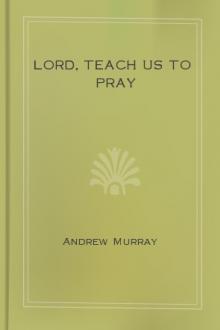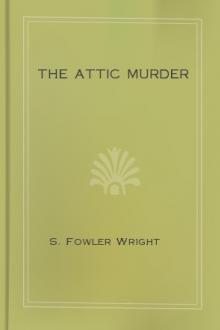Where No Fear Was, Arthur Christopher Benson [the little red hen read aloud txt] 📗

- Author: Arthur Christopher Benson
Book online «Where No Fear Was, Arthur Christopher Benson [the little red hen read aloud txt] 📗». Author Arthur Christopher Benson
Again, I was once engulfed in a crevasse, hanging from the ice-ledge with a portentous gulf below, and a glacier-stream roaring in the darkness. I could get no hold for foot or hand, my companions could not reach me or extract me; and as I sank into unconsciousness, hearing my own expiring breath, I knew that I was doomed; but I can only say, quite honestly and humbly, that I had no fear at all, and only dimly wondered what arrangements would be made at Eton, where I was then a master, to accommodate the boys of my house and my pupils. It was not done by an effort, nor did I brace myself to the situation: fear simply did not come near to me.
Once again I found myself confronted, not so long ago, with an incredibly painful and distressing interview. That indeed did oppress me with almost intolerable dread beforehand. I was to go to a certain house in London, and there was just a chance that the interview might not take place after all. As I drove there, I suddenly found myself wondering whether the interview could REALLY be going to take place--how often had I rehearsed it beforehand with anguish--and then as suddenly became aware that I should in some strange way be disappointed if it did not take place. I wanted on the whole to go through with it, and to see what it would be like. A deep-seated curiosity came to my aid. It did take place, and it was very bad--worse than I could have imagined; but it was not terrible!
These are just four instances which come into my mind. I should be glad to feel that the courage which undoubtedly came had been the creation of my will; but it was not so. In three cases, the events came unexpectedly; but in the fourth case I had long anticipated the moment with extreme dread. Yet in that last case the fear suddenly slipped away, without the smallest effort on my part; and in all four cases some strange gusto of experience, some sense of heightened life and adventure, rose in the mind like a fountain--so that even in the crevasse I said to myself, not excitedly but serenely, "So this is what it feels like to await death!"
It was this particular experience which gave me an inkling into that which in so many tragic histories seems incredible--that men often do pass to death, by scaffold and by stake, at the last moment, in serenity and even in joy. I do not doubt for a moment that it is the immortal principle in man, the sense of deathlessness, which comes to his aid. It is the instinct which, in spite of all knowledge and experience, says suddenly, in a moment like that, "Well, what then?" That instinct is a far truer thing than any expectation or imagination. It sees things, in supreme moments, in a true proportion. It asserts that when the rope jerks, or the flames leap up, or the benumbing blow falls, there is something there which cannot possibly be injured, and which indeed is rather freed from the body of our humiliation. It is but an incident, after all, in a much longer and more momentous voyage. It means only the closing of one chapter of experience and the beginning of another. The base element in it is the fear which dreads the opening of the door, and the quitting of what is familiar. And I feel assured of this, that the one universal and inevitable experience, known to us as death, must in reality be a very simple and even a natural affair, and that when we can look back upon it, it will seem to us amazing that we can ever have regarded it as so momentous and appalling a thing.
III
THE DARKEST DOUBT
Now we can make no real advance in the things of the spirit until we have seen what lies on the other side of fear; fear cannot help us to grow, at best it can only teach us to be prudent; it does not of itself destroy the desire to offend--only shame can do that; if our wish to be different comes merely from our being afraid to transgress, then, if the fear of punishment were to be removed, we should go back with a light heart to our old sins. We may obey irresponsible power, because we know that it can hurt us if we disobey; but unless we can perceive the reason why this and that is forbidden, we cannot concur with law. We learn as children that flame has power to hurt us, but we only dread the fire because it can injure us, not because we admire the reason which it has for burning. So long as we do not sin simply because we know the laws of life which punish sin, we have not learned any hatred of sin; it is only because we hate the punishment more than we love the sin, that we abstain.
Socrates once said, in one of his wise paradoxes, that it was better to sin knowingly than ignorantly. That is a hard saying, but it means that at least if we sin knowingly, there is some purpose, some courage in the soul. We take a risk with our eyes open, and our purpose may perhaps be changed; whereas if we sin ignorantly, we do so out of a mere base instinct, and there is no purpose that may be educated. Anyone who has ever had the task of teaching boys or young men to write will know how much easier it is to teach those who write volubly and exuberantly, and desire to express themselves, even if they do it with many faults and lapses of taste; taste and method may be corrected, if only the instinct of expression is there. But the young man who has no impulse to write, who says that he could think of nothing to say, it is impossible to teach him much, because one cannot communicate the desire for expression.
And the same holds good of life. Those who have strong vital impulses can learn restraint and choice; but the people who have no particular impulses and preferences, who just live out of mere impetus and habit, who plod along, doing in a dispirited way just what they find to do, and lapsing into indolence and indifference the moment that prescribed work ceases, those are the spirits that afford the real problem, because they despise activity, and think energy a mere exhibition of fussy diffuseness.
But the generous, eager, wilful nature, who has always some aim in sight, who makes mistakes perhaps, gives offence, collides high-heartedly with others, makes both friends and enemies, loves and hates, is anxious, jealous, self-absorbed, resentful, intolerant--there is always hope for such an one, for he is quick to despair, capable of shame, swift to repent, and even when he is worsted and wounded, rises to fight again. Such a nature, through pain and love, can learn to chasten his base desires, and to choose the nobler and worthier way.
But what does really differentiate men and women is not their power of fearing and suffering, but their power of caring and admiring. The only real and vital force in the world is the force which attracts, the beauty which is so desirable that one must imitate it if one can, the wisdom which is so calm and serene that one must possess it if one may.
And thus all depends upon our discerning in the world a loving intention of some kind, which holds us in view, and draws us to itself. If we merely think of God and nature as an inflexible system of laws, and that our only chance of happiness is to slip in and out of them, as a man might pick his way among red-hot ploughshares, thankful if he can escape burning, then we can make no sort of advance, because we can have neither faith nor trust. The thing from which one merely flees can have no real power over our spirit; but if we know God as a fatherly Heart behind nature, who is leading us on our way, then indeed we can walk joyfully in happiness, and undismayed in trouble; because troubles then become only the wearisome incidents of the upward ascent, the fatigue, the failing breath, the strained muscles, the discomfort which is actually taking us higher, and cannot by any means be avoided.
But fear is the opposite of all this; it is the dread of the unknown, the ghastly doubt as to whether there is any goal before us or not; when we fear, we are like the butterfly that flutters anxiously away from the boy who pursues it, who means out of mere wantonness to strike it down tattered and bruised among the grass-stems.
IV
VULNERABILITY
There have been many attempts in the history of mankind to escape from the dominion of fear; the essence of fear, that which prompts it, is the consciousness of our vulnerability. What we all dread is the disease or the accident that may disable us, the loss of money or credit, the death of those whom we love and whose love makes the sunshine of our life, the anger and hostility and displeasure and scorn and ill-usage of those about us. These are the definite things which the anxious mind forecasts, and upon which it mournfully dwells.
The object then in the minds of the philosophers or teachers who would fain relieve the unhappiness of the world, has been always to suggest ways in which this vulnerability may be lessened; and thus their object has been to disengage as far as possible the hopes and affections of men from things which must always be fleeting. That is the principle which lies behind all asceticism, that, if one can be indifferent to wealth and comfort and popularity, one has a better chance of serenity. The essence of that teaching is not that pleasant things are not desirable, but that one is more miserable if one loses them than if one never cares for them at all. The ascetic trains himself to be indifferent about food and drink and the apparatus of life; he aims at celibacy partly because love itself is an overmastering passion, and partly because he cannot bear to engage himself with human affections, the loss of which may give him pain. There is, of course, a deeper strain in asceticism than this, which is a suspicious mistrust of all physical joys and a sense of their baseness; but that is in itself an artistic preference of mental and spiritual joys, and a defiance to everything which may impair or invade them.
The Stoic imperturbability is an attempt to take a further step; not to fly from life, but to mingle with it, and yet to grow to be not dependent on it. The Stoic





Comments (0)